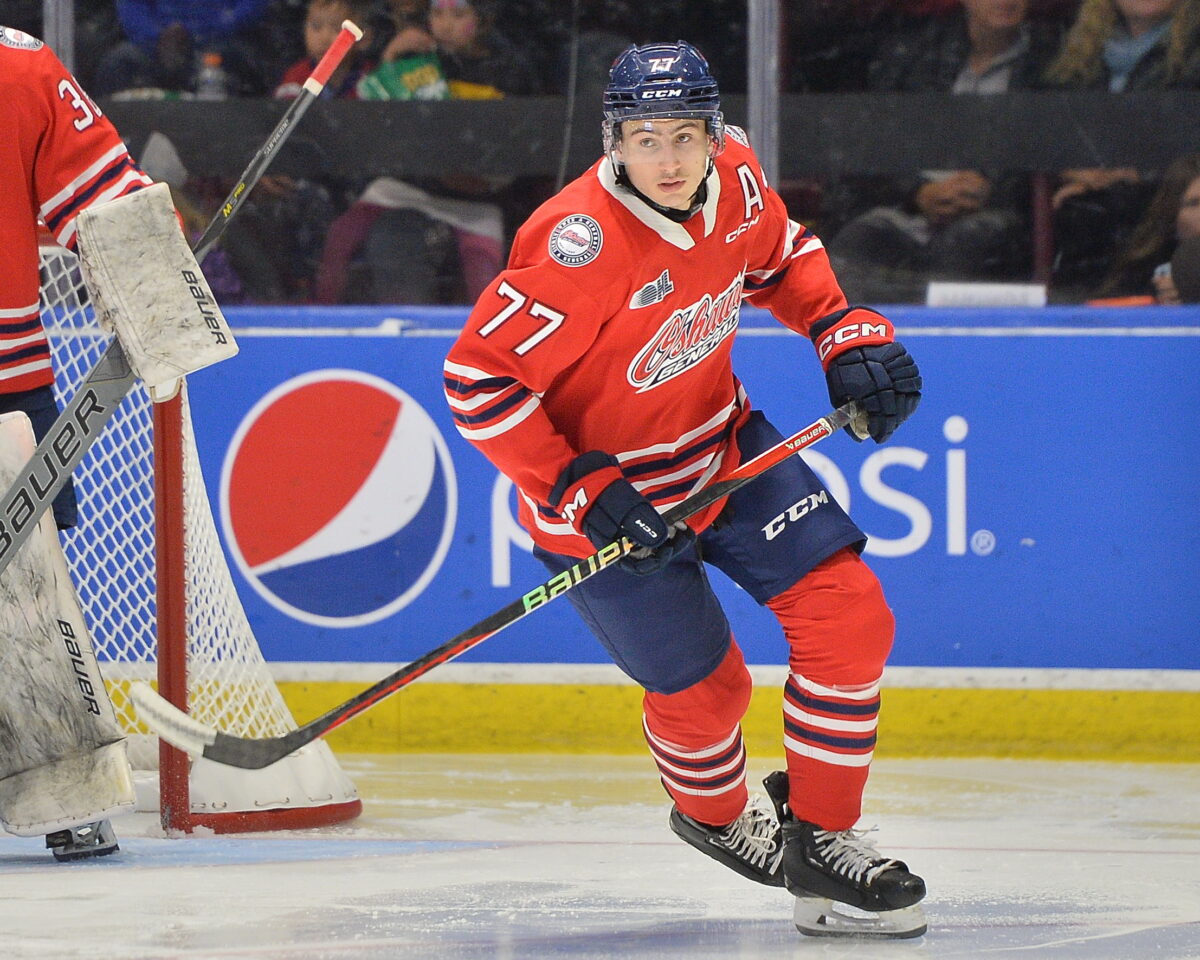A longstanding question hangs over the Toronto Maple Leafs‘ development of young defensemen. Can they develop, grow, and thrive in a city with fans as intense and demanding as Toronto? With the recent departures of two promising Swedish defensemen, Rasmus Sandin two seasons ago and Timothy Liljegren this past week, it’s worth asking if this is a place where emerging blueliners can flourish.
Related: How Does the Maple Leafs Jake McCabe Extension Impact John Tavares Negotiations?
If you think the trouble is over, it’s likely not. This scrutiny promises to extend to prospects like Ben Danford, who was drafted with high hopes this past offseason. He potentially faces the same pressures that plagued Sandin, Liljegren, and other Maple Leafs defensemen in the past. Here’s a closer look at why Toronto might be the wrong environment for developing young defensemen.
A Challenging History for Defensemen in Toronto
Toronto’s defensive core has long been held to exceptionally high standards, with a history of players struggling to handle the scrutiny. There are numerous examples from the past, including Hall of Famer Larry Murphy, Nikita Zaitsev, and Jake Gardiner. One might even stretch the case to suggest that Dion Phaneuf came to Toronto from the Calgary Flames as a solid defenseman at the end of the 2009-10 season and left seven seasons later as a shell of his former self. By the time he was traded to the Ottawa Senators in 2015-16, he was playing on fumes.
Murphy, a Hall of Fame defenseman, is one of the most well-known examples of a talented player who couldn’t escape criticism during his time in Toronto. Despite his success elsewhere, he faced unrelenting scrutiny and was ultimately traded. Similarly, Zaitsev and Gardiner, though skilled in their own ways, were heavily criticized for mistakes and often bore the brunt of fan frustration. Zaitsev was never the player he was expected to become. While that might have been a wrong guess by former Maple Leafs general manager Lou Lamoriello, the honest answer is that no one will ever know.
Related: Was Lou Lamoriello as Good as Maple Leafs Fans Remember
The issue with young defensemen in Toronto is that every error is magnified under the microscope of a passionate fanbase. If they make mistakes in critical moments, the crowd rarely lets them forget them. Sandin and Liljegren faced similar scrutiny, unable to find a steady spot on a team that was constantly in “win-now” mode.
The Impact of High Expectations, Little Development Time, and a Win-Now Environment
The intense atmosphere and “win-now” pressure seem especially unkind to younger defensemen, who need time and space to learn from mistakes. The Maple Leafs have long prioritized winning immediately, and developing players is often secondary to results. This is a challenging environment for young players who need to make and learn from their mistakes as part of their development.

Forwards might face less criticism due to the lower visibility of their errors. They, too, can make egregious errors. However, they seldom are glued to a goal that ensues mere seconds later. For defensemen, any mistake made near the net or resulting in a goal is obvious and, for many fans, unforgivable. The emotional toll of this scrutiny can be immense. Sandin was moved eventually for a rental defenseman, Erik Gustafsson, and a first-round pick despite showing developmental promise. Liljegren was moved a few days ago for basically nothing for who knows what reason.
Surviving the Toronto Pressure: Why Only a Few Succeed
Most young defensemen haven’t lasted in Toronto. However, a few, like Morgan Rielly, have thrived under the city’s intense spotlight. Rielly is unique. He remains among the few homegrown defensemen who succeeded with the Maple Leafs. Since being drafted, he’s adapted, improved, and established himself as a core part of the team, even through changing coaching staff and management.
Related: Why Jake Gardiner Will Leave the Toronto Maple Leafs
Rielly’s resilience might be partly due to his temperament. He seems to possess the mental toughness needed to withstand Toronto’s pressures. For most young defensemen, however, this level of resilience is challenging to cultivate quickly enough to meet expectations. Rielly’s success shows just how good a defenseman he is, although that point might be argued by Maple Leafs fans – which is merely the point.
From Babcock to Berube: The Challenges Remain
Toronto’s coaching changes haven’t helped ease the pressure on young defensemen. Since Mike Babcock, through Sheldon Keefe and now Craig Berube, Toronto’s young defensemen have been subject to various coaching styles and systems. While coaching philosophy varies, one constant has been the pressure on the players to be error-free.

Whether under Babcock’s structured system, Keefe’s more fluid approach, or Berube’s emphasis on grit and defensive accountability, the expectations have remained sky-high, with little patience for mistakes. With Danford in the Maple Leafs’ system, questions about how he’ll manage under Toronto’s unforgiving environment must be asked. One can only hope he comes from the Rielly mould, not the Zaitsev mould.
Will Danford Thrive, or Will He Be “Eaten Alive?”
As a new prospect, Danford enters a system where recent predecessors like Sandin and Liljegren struggled to land long-term roles. The Maple Leafs’ demanding environment doesn’t allow young defensemen the same room to make mistakes and grow as they might find in a more patient franchise. Even Simon Benoit, who displays as much dedication and effort as anyone on the roster, might soon be under heavy scrutiny if he makes high-visibility mistakes. And, of course, he will – as all defensemen do. The other teams have good players, too.
Related: Comparing the 2024-25 Maple Leafs to Last Season
For Danford and other prospects, surviving in Toronto will require exceptional resilience and the ability to endure fan and media pressure.
What’s Next for Maple Leafs Defensemen?
The fate of Toronto’s defensemen ultimately lies in the team’s ability to either shift its developmental approach or select players who are prepared for the rigours of this market. For now, the city’s intense passion for the Maple Leafs continues to create an almost impossible challenge for young defensemen. Only a few can navigate the pressures and succeed.
Whether Toronto will become a nurturing environment for developing defensemen remains an open question that Danford and future draft picks will soon face. Toronto’s history is not in his favour.
